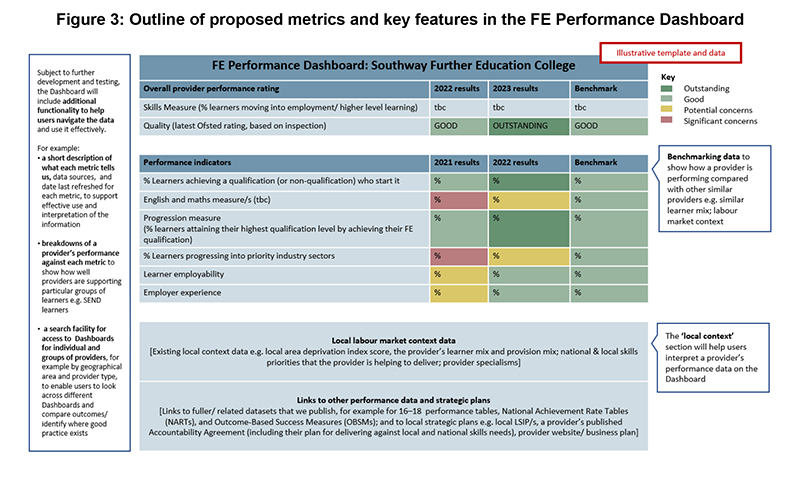Proposals for multi-year adult education budgets, “simplified” funding bands and public provider performance dashboards have been firmed up as the government presses ahead with its overhaul of adult education funding in England.
Officials at the Department for Education published proposals to reform funding and accountability models a year ago but have today released a second stage consultation with more detail.
Some accountability reforms will be rolled out in the coming 22/23 academic year, while the more ambitious funding reforms are proposed to take place in 23/24 and in to the next spending review period.
The second stage consultation focuses on implementation, with the sector now being asked to provide feedback on five new proposed funding bands for adult education courses, a successor to the adult education budget (AEB) and bringing in a lagged funding model for adult education.
Here’s what you need to know:
AEB becomes the skills fund
DfE is pressing ahead with its proposal to introduce a “simpler” adult education funding model and had originally proposed to consolidate seven separate funding lines into a single skills fund.
It now proposes that, starting in 23/24, colleges will receive a combined AEB (including community learning) and free courses for jobs (FCFJ) allocation under the ‘skills fund’ heading.
A decision will be made at the next spending review on integrating the FCFJ pot into mainstream budgets.
Funding for skills bootcamps and adult training funding from the UK shared prosperity fund, will though continue to be separate.
The idea is that a combined skills fund will free up providers to be more responsive to local needs.
Colleges will sign new accountability agreements which are promised to be “significantly shorter than current funding agreements” according to DfE.
The new agreements will stipulate the national priorities the fund can be spent on, as well as highlighting specific ringfences and rules for non-qualification provision and development of “innovative” new courses.
The Department wants to “re-orientate the vision for non-qualification provision” by proposing that all provision must achieve at least one of three set objectives; achieving employment, progression to further learning that brings learners close to employment and helping learners with learning difficulties and/or disabilities to access independent living.
Colleges will also have to set themselves “a small number of outcome targets” and set out how they will adapt their provision to meet local needs as part of the agreements.
There will be a draft later this year.
DfE also wants to push ahead with its plans to move away from setting allocations based on historic performance towards a “needs-based” funding formula to be introduced in the next spending review period.
Another set of budgets to be consolidated are the various sector support grants. After the next spending review, the strategic development fund, college collaboration fund, workforce industry exchange programme, higher technical education growth fund and the FE professional development grant will become a single ‘development fund’.
Getting a grip on devolved authorities
The current level of adult education budget spent in devolved combined authorities is 60 per cent. That figure is set to grow continually over the coming years until the ambitions of the government’s levelling up ambition of a wholly-devolved adult skills system is realised.
The DfE reports that providers were uneasy about inconsistencies in funding and assurance approaches as the list of adult education commissioning bodies is set to grow ever larger.
As well as bringing in a needs-based formula for mayoral combined authorities, the DfE wants local areas to use a national funding model it develops when designing and implementing their plans for the skills fund.
“Taking this approach would mean any differences between local areas had a clear rationale and would minimise the extent of differences that employers and providers need to navigate,” today’s document says.
A rise in rates for priority provision
Courses in high priority skills areas could see funding rates rise from 2023/24.
This Autumn, courses will be organised in to SSA categories and placed in one of five funding bands; base, low, middle, high and specialist with a set hourly funding rate.
Courses in health and social care currently attract a “low” programme weighting, but are proposed to be added to the “middle” funding band in the new system. Engineering courses, currently in the “medium” category could be moved to “high”.
The Department promises that the rates set for each band will be informed by analysis of skills needs and new research it has conducted on delivery costs.
This way, it argues, a higher funding premium is attached to courses for in-demand skills and those that are more expensive to staff and deliver.
No SSA will be moved to a lower funding band than existing programmes, the DfE has said, and accommodations will be made for advanced learner loan funded students in courses attracting higher funding rates.
The future is lagged
Once the new funding rates are in place, the DfE wants to end the cycle of allocation and reconciliation.
Despite receiving a “mixed response” in the consultation, the DfE says it “continues to think a lagged approach [to the skills fund], which gives providers a firm allocation for the immediate year, is the best approach.”
However the model won’t change until the new funding bands are established and devolved authorities will be free to choose whether or not to follow suit.
Providers and MCAs can also look forward to multi-year allocations.
The DfE proposes to provide 23/24 and 24/25 skills fund allocations based on 22/23 allocations unless there’s evidence of a shortfall or over-delivery. Mayoral combined authorities will receive an indicative 24/25 budget with their 23/24 allocation.
Bringing down the data burden?
Officials are developing a new data collection system which could eliminate the need for regular ILR returns. According to today’s document, work is underway to develop “an online ILR collection approach where data is stored within DfE data storage”.
There were no timescales attached to this proposal.
However one of the benefits would be to provide timely data for the new FE performance dashboard and the new Unit for Future Skills.
Providers will certainly welcome a reduced data burden, however any excitement may be short-lived.
Said FE performance dashboard contains a range of new performance measures which seem to complement, rather than replace, existing measures like the performance tables, NARTs and outcome measures.
The new skills measure, proposed somewhat vaguely a year ago, will be a complex calculation of “expected progression rate” of students against their “actual progression rate” while also taking into account learner characteristics like free school meals and prior attainment, as well as the provider’s local economic context.
The dashboard will not include, as was originally proposed, the provider’s ESFA financial health grade because doing so “could negatively impact on learner enrolment and employer engagement, making a provider’s financial position worse.”
The dashboard will be rolled out in 23/24 and could look like this (click to enlarge):

Providers, learners and representative organisations can see the proposals in full here and have until September 21 to respond to the consultation.

















Hi,
‘that all provision must achieve at least on of three set objectives’, should read at least ONE of three
Thanks
Peter
Sorted. Thanks, Peter.